|
|
|
Sort Order |
|
|
|
Items / Page
|
|
|
|
|
|
|
| Srl | Item |
| 1 |
ID:
169504
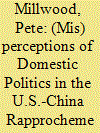

|
|
|
|
|
| Summary/Abstract |
In 1971, the governments of the United States (U.S.) and China resumed a high-level diplomatic dialogue after two decades of nearly hermetic isolation and simmering conflict that had followed the foundation of the People’s Republic of China (PRC) in 1949. More than seven turbulent years later, the two governments “normalized” their relationship and formally resumed official diplomatic relations, having resolved or indefinitely shelved their most fundamental points of conflict. A number of Chinese, U.S., and international scholars have argued that the varying condition of U.S. and particularly Chinese domestic politics was a critical determinant of the sea change in the relationship in this period. The Cultural Revolution dashed tentative U.S. hopes of re-establishing contact in the late 1960s before the winding down of that movement in the early 1970s paved the way for a beginning to rapprochement; the Watergate crisis helped delay normalization beyond President Richard Nixon’s time in office and until the rise of Deng Xiaoping in 1978, whose domestic agenda of rapid modernization expedited a final bilateral agreement.
|
|
|
|
|
|
|
|
|
|
|
|
|
|
|
|
| 2 |
ID:
102429
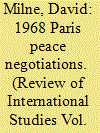

|
|
|
|
|
| Publication |
2011.
|
| Summary/Abstract |
This article draws on fresh archival research to challenge Robert Putnam's 'Two Level Game Theory'. In his seminal article, 'Diplomacy and Domestic Politics: The Logic of Two Level Games', published by International Organization in 1988, Putnam contended that international negotiations proceed at the domestic level and at the international level. In taking diplomatic initiatives forward, leaders are compelled to respond to the needs of domestic constituencies, through granting concessions and building coalitions, while international negotiations are pursued with one goal in mind: that any agreement will not damage the domestic political calculus. This article contends that Lyndon Johnson's actions in 1968 disprove this thesis. The President was in fact relaxed about a Richard Nixon victory in the general election as his commitment to defend South Vietnam from communism was stronger than that of his sitting Vice President, Hubert Humphrey. The President's concern for the fate of South Vietnam thus superseded his concern for his 'normal supporters'- the Democratic Party at large - who had become so hostile towards his management of the Vietnam War.
|
|
|
|
|
|
|
|
|
|
|
|
|
|
|
|
| 3 |
ID:
140688


|
|
|
|
|
| Summary/Abstract |
In this article, I show how Prime Minister Abe Shinzo has promoted two major national and international economic policies—Abenomics and Japan’s involvement in the Trans-Pacific Partnership— by focusing on his administration’s domestic political struggles. Both agendas become significant in the face of China’s regional engagement, demonstrating the inextricable ties between international affairs and domestic politics, a combination essential for grasping the “Abe effect” in foreign policy. KEYWORDS: Abenomics, TPP, decisionmaking process, agricultural reform in Japan.
|
|
|
|
|
|
|
|
|
|
|
|
|
|
|
|
| 4 |
ID:
152414
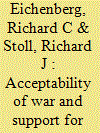

|
|
|
|
|
| Summary/Abstract |
We study the factors that influence citizen support for defense spending in fourteen democracies over the period 2004–2013. We pose two research questions. First, what factors influence citizen support for war and military force? We refer to this as the acceptability of war. Second, in addition to the acceptability of war, what other factors affect support for defense spending? Our principal finding is that citizen acceptance of war and support for defense spending are most influenced by basic beliefs and values. Gender also has a strong negative influence on attitudes toward war and thus indirectly lowers support for defense spending among women. Attitudes toward war and defense spending are also sometimes influenced by short-term threats and by alliance considerations, but the effects are not as substantively meaningful. We conclude with a summary of the results and a discussion of the implications for theory and policy.
|
|
|
|
|
|
|
|
|
|
|
|
|
|
|
|
| 5 |
ID:
112280
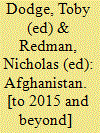

|
|
|
|
|
| Publication |
Oxon, International Institute for Strategic Studies, 2011.
|
| Description |
299p.
|
| Series |
Adelphi Series No. 425-26
|
| Standard Number |
9780415696425
|
|
|
|
|
|
|
|
|
|
|
|
Copies: C:1/I:0,R:0,Q:0
Circulation
| Accession# | Call# | Current Location | Status | Policy | Location |
| 056419 | 958.1047/DOD 056419 | Main | On Shelf | General | |
|
|
|
|
| 6 |
ID:
174909
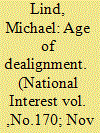

|
|
|
| 7 |
ID:
154742
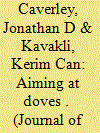

|
|
|
|
|
| Summary/Abstract |
Politicians (and journalists covering them) assume that association with the military has political consequences. We propose and experimentally test conditions under which military images have such effects. We presented subjects with images of the US president before varying backgrounds—including soldiers, students, children, and “ordinary” people. Only the image of soldiers has any significant effect, shifting participant preferences toward spending money on defense over education. The image does this by increasing respondent sense of threats to national security, despite the military’s depiction out of combat and in the background. The soldiers image does little to shift opinion about the president. However, the image has the largest hawkish effect on both the president’s copartisans and the strongest supporters. Given the routine use by many democracies of tactics unlikely to produce images of one’s fellow citizens in combat, the power of more sanitized images to cue hawkish policy preferences requires increased attention.
|
|
|
|
|
|
|
|
|
|
|
|
|
|
|
|
| 8 |
ID:
171096
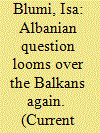

|
|
|
|
|
| Summary/Abstract |
Brussels and Washington had imposed a regime that subordinated the long-term goals of Albanians to the economic and political agendas of the Western powers.
|
|
|
|
|
|
|
|
|
|
|
|
|
|
|
|
| 9 |
ID:
097895


|
|
|
| 10 |
ID:
110161
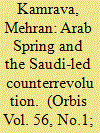

|
|
|
|
|
| Publication |
2012.
|
| Summary/Abstract |
The author contends that the Arab Spring has provided an opening for the Gulf Cooperation Council as a group and for Saudi Arabia as a long-time aspiring leader of the Arab world to try to expand their regional influence and global profile. An already weakened Arab state system, he argues, has been once again weakened by the sweeping wave of rebellion.
With its final chapter yet to be written, the Arab Spring of 2011 is likely to go down in history as a season of profound political changes that swept across the domestic politics of the Arab world. Even at this preliminary stage, that much is clear. What remains unclear, however, is how political change sweeping across the Middle East and North Africa is likely to alter the international relations of the Arab world in general and, in particular, the larger regional position and specific policy preferences of the Gulf Cooperation Council (GCC). Important considerations include the GCC's posture and profile vis-à-vis the Arab Spring, its collective reaction to the region-wide movements for political change, and its delicate relationship with its two troubled neighbors to the north, namely Iran and Iraq.
While the Arab Spring is unlikely to result in meaningful changes in Iran and Iraq's relationships with the GCC, it has fostered two discernible trends in the larger Arab world. First, Saudi Arabia has sought to reassert its position of prominence and leadership within the GCC. In fact, the kingdom has positioned itself as the chief architect of a counterrevolution to contain, and perhaps to even reverse, the Arab Spring as much as possible. Second, and an outgrowth of the first development, is the GCC's attempt to solidify its identity and mandate through the inclusion of additional Sunni monarchies-Morocco and Jordan-as a counterbalance, if not a substitute, to the Arab League.
|
|
|
|
|
|
|
|
|
|
|
|
|
|
|
|
| 11 |
ID:
160488
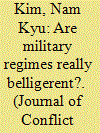

|
|
|
|
|
| Summary/Abstract |
Does military rule make a state more belligerent internationally? Several studies have recently established that military autocracies are more likely than civilian autocracies to deploy and use military force in pursuit of foreign policy objectives. I argue that military regimes are more likely to resort to military force because they are located in more hostile security environments, and not because they are inherently aggressive. First, I show that rule by military institution is more likely to emerge and exist in states facing external territorial threats. Second, by examining the relationship between military autocracies and conflict initiation, I find that once I control for states’ territorial threats, the statistical association between military regimes and conflict initiation disappears. Additionally, more evidence suggests that civilian dictatorships are more conflict-prone than their military counterparts when I account for unobserved dyad heterogeneity. The results are consistent across different measures of international conflict and authoritarian regimes.
|
|
|
|
|
|
|
|
|
|
|
|
|
|
|
|
| 12 |
ID:
152945
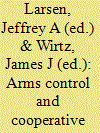

|
|
|
|
|
| Publication |
New Delhi, Viva Books, 2011.
|
| Description |
xiv, 288p.hbk
|
| Standard Number |
9788130915302
|
|
|
|
|
|
|
|
|
|
|
|
Copies: C:1/I:0,R:0,Q:0
Circulation
| Accession# | Call# | Current Location | Status | Policy | Location |
| 059059 | 355.02/LAR 059059 | Main | On Shelf | General | |
|
|
|
|
| 13 |
ID:
162503
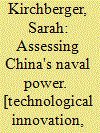

|
|
|
|
|
| Publication |
Heidelberg, Springer, 2015.
|
| Description |
xx, 318p.hbk
|
| Series |
Global Power Shift: Comparative Analysis and Perspectives
|
| Standard Number |
9783662471265
|
|
|
|
|
|
|
|
|
|
|
|
Copies: C:1/I:0,R:0,Q:0
Circulation
| Accession# | Call# | Current Location | Status | Policy | Location |
| 059559 | 359.00951/KIR 059559 | Main | On Shelf | General | |
|
|
|
|
| 14 |
ID:
147642
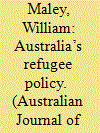

|
|
|
|
|
| Summary/Abstract |
Refugee policy involves a two-level game. For Australia since approximately 1998, the politics of refugees has been toxically affected by domestic politics. This has had potentially negative effects on Australia’s reputation and soft power. This article provides an overview of the issue, explores the ways in which considerations of domestic politics have come increasingly to shape Australia’s policy and concludes with a discussion of the consequences of Australia’s treatment of refugees for its diplomacy and soft power.
|
|
|
|
|
|
|
|
|
|
|
|
|
|
|
|
| 15 |
ID:
097412
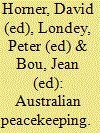

|
|
|
|
|
| Publication |
Cambridge, Cambridge University Press, 2009.
|
| Description |
xviii, 333p.
|
| Standard Number |
9780521735926
|
|
|
|
|
|
|
|
|
|
|
|
Copies: C:1/I:0,R:0,Q:0
Circulation
| Accession# | Call# | Current Location | Status | Policy | Location |
| 055046 | 355.3570994/HOR 055046 | Main | On Shelf | General | |
|
|
|
|
| 16 |
ID:
148496


|
|
|
|
|
| Summary/Abstract |
The paper looks at the concept of political ‘hybridity’ within the broader framework of Pakistan’s domestic politics. Whilst analysing Pakistan’s domestic politics, most analysts tend to view the country’s political system as authoritarian and label it as a military dictatorship. Whilst this has been true for most of Pakistan’s history since it came into existence in 1947, it is also equally important to look at the role played by the more democratic elements of Pakistani society in politics, and the interactions that have taken place between the more democratic forces on the one hand, and the more authoritarian elements on the other. This paper moves away from traditional ways of viewing Pakistan’s domestic politics and focuses more on the grey areas, instead of viewing the country in black or white terms. In doing so, the paper has a strong focus on Ayub Khan’s concept of Basic Democracy.
|
|
|
|
|
|
|
|
|
|
|
|
|
|
|
|
| 17 |
ID:
054366


|
|
|
| 18 |
ID:
084594
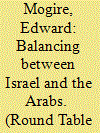

|
|
|
|
|
| Publication |
2008.
|
| Summary/Abstract |
This article attempts to illuminate Kenya-Middle East relations using a range of indicators such as trade, political-diplomatic interactions and Kenya's reaction to the Arab-Israel conflict. It examines the main factors underpinning this relationship and the form it is likely to take in the future. It shows that Kenya has strived to maintain relations with both the Arab-Islamic states and Israel. Although at the multilateral level Kenya's orientation tends to be pro-Arab, at the bilateral level it has maintained a close relationship with Israel. Kenya's foreign policy is non-alignment, support for African unity, and a radical orientation characterized by idealism as well as economic and security interests. Internal political imperatives, especially the Muslim influence, are the main factors underpinning Kenya-Middle East relations. While economic considerations will propel Kenya to strengthen its relations with Arab countries, security concerns, especially in the light of terrorist attacks, will ensure that relations with Israel will remain strong.
|
|
|
|
|
|
|
|
|
|
|
|
|
|
|
|
| 19 |
ID:
091832


|
|
|
|
|
| Publication |
2009.
|
| Summary/Abstract |
After a hiatus of two years Bangladesh held its Ninth Jatiya Sangsad (Parliament) elections in December 2008. Hailed by many as another liberation of Bangladesh, the new year ushered in a Awami League government led by Sheikh Hasina on 6 January 2009.
|
|
|
|
|
|
|
|
|
|
|
|
|
|
|
|
| 20 |
ID:
133937
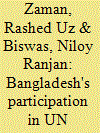

|
|
|
|
|
| Publication |
2014.
|
| Summary/Abstract |
This article argues that the participation of the Bangladeshi armed forces in UN peacekeeping has produced positive benefits for civil-military relations in the country and that this process is best explained by reference to concordance theory, as propagated by Rebecca Schiff. Unlike traditional theories of civil-military relations, concordance theory highlights dialogue, accommodation and shared values or objectives held by the military, the political elites and society. We argue in this paper that peacekeeping has gradually emerged in Bangladesh as an issue where all three partners are converging and prone to hold similar views. This may have a profound impact upon Bangladeshi politics whereby the chances of military intervention in domestic politics will lessen. This paper helps in understanding the implications of Bangladesh's involvement in UN peace missions, an issue on which little work has been conducted until now despite the fact that it has important implications for both the Bangladesh state and its armed forces.
|
|
|
|
|
|
|
|
|
|
|
|
|
|
|
|
|
|
|
|
|